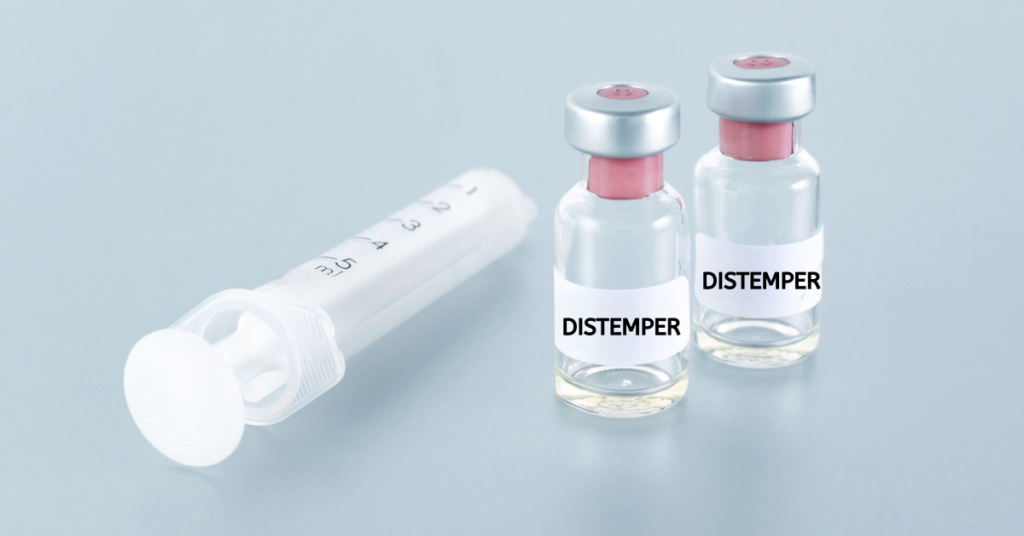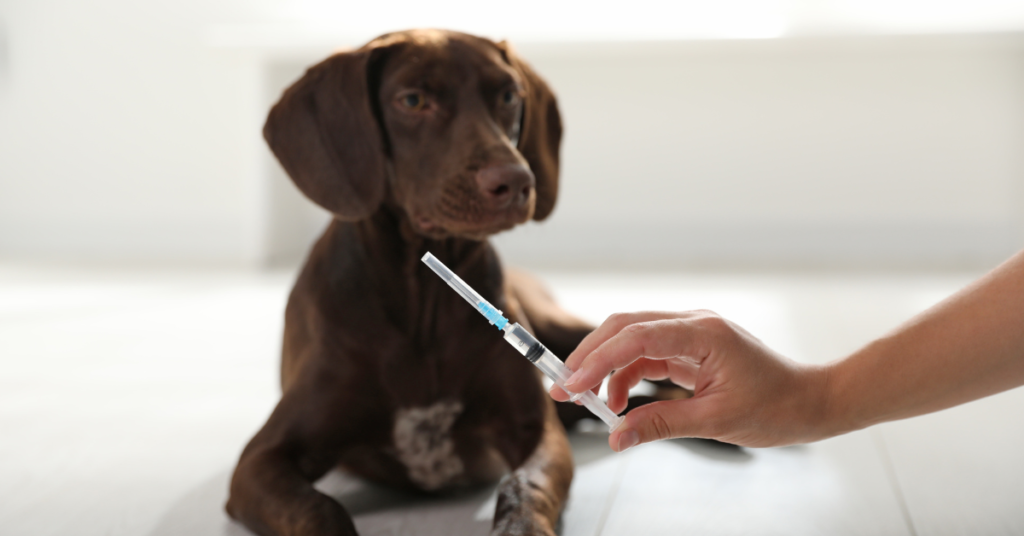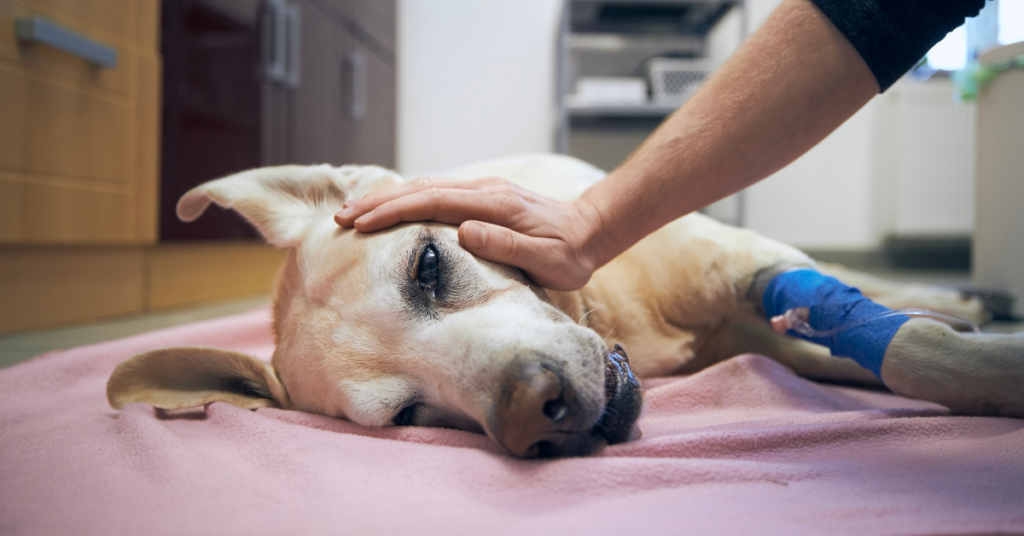Canine Distemper Virus (CDV) is a highly contagious and often fatal viral disease that affects dogs. This virus attacks a dog’s respiratory, gastrointestinal, and central nervous systems, leading to a range of symptoms that can be life-threatening. Distemper is caused by a paramyxovirus, which is related to the virus that causes measles in humans. This virus spreads easily, especially in areas where dogs come into close contact with each other, such as kennels or parks. Understanding how this virus works and how to protect your dog from it is essential for every pet owner.
*Disclaimer: This Post May Contain Affiliate Links. This Means That I Receive A Small Commission At No Extra Cost To You Should You Click Through And Make A Purchase. Learn More On My Policy Page
The Facts:
- Highly Contagious: Spread through airborne particles and direct contact with infected animals.
- Affects Multiple Systems: Targets the respiratory, gastrointestinal, and nervous systems.
- Symptoms: Include coughing, nasal discharge, fever, vomiting, and seizures.
- No Cure: Supportive care is crucial for managing symptoms.
- Puppies at Higher Risk: Young, unvaccinated dogs are the most vulnerable.
- Vaccination is Essential: Prevents the spread and severity of the disease.
- Deadly: Can be fatal, especially if untreated.
Always consult a vet for proper prevention and care.
How Does Canine Distemper Virus Spread?
The virus spreads through direct contact with an infected animal or through airborne exposure.
A dog can become infected by inhaling droplets from an infected dog’s coughs or sneezes.
The virus can also spread through shared food bowls, water dishes, or other contaminated objects.
It’s important to note that wild animals, such as raccoons, foxes, and ferrets, can carry and transmit the virus to dogs.
Because of the contagious nature of distemper, puppies and unvaccinated dogs are at the highest risk.
What Are the Symptoms of Canine Distemper?
The symptoms can vary widely depending on the stage of the infection.
Early signs are often mild and may be mistaken for other illnesses.
However, as the virus progresses, symptoms can become more severe.
Here are common symptoms to watch for:
- Fever (usually 3-6 days after infection)
- Coughing
- Runny nose or discharge from eyes
- Lethargy or fatigue
- Vomiting and diarrhea
- Loss of appetite
- Thickening of foot pads (referred to as “hard pad disease”)
In more severe cases, the virus can attack the nervous system, leading to:
- Twitching or seizures
- Paralysis
- Circling behavior
- Head tilt
If left untreated, the disease can lead to permanent neurological damage or death.
Here are some products that can help you care for your dog with Canine Distemper:
- Immune System Support Supplements: Boost your dog’s immunity for better protection.
- Dog Crate for Isolation: Safely quarantine infected dogs during recovery.
- Dog Rehydration Electrolytes: Keep your dog hydrated during treatment.
- Digital Thermometers for Pets: Monitor your dog’s temperature for signs of fever.
How Is Canine Distemper Diagnosed?
If your dog is showing symptoms of distemper, it’s crucial to visit a vet immediately.
Diagnosing distemper can be challenging, as its symptoms are similar to other diseases.
Your vet may perform a combination of tests to confirm a diagnosis:
- Physical examination to check for symptoms.
- Blood tests to detect the virus or changes in white blood cell counts.
- PCR test (Polymerase Chain Reaction) to identify the virus’s DNA.
Early diagnosis is important for the best chance of survival and to prevent the spread of the virus to other dogs.
What Is the Treatment for Canine Distemper Virus?
Unfortunately, there is no cure.
Treatment focuses on managing symptoms and supporting the dog’s immune system as it fights the virus.
Your vet may recommend the following:
- Fluids to prevent dehydration from vomiting or diarrhea.
- Antibiotics to treat secondary bacterial infections.
- Medications to control seizures or fevers.
- Nutritional support if the dog refuses to eat.
The goal is to keep the dog as comfortable as possible while their immune system works to combat the infection.
In severe cases, hospitalization may be required.
Dr. Alson Sears, featured on Kind Hearts In Action, pioneered the use of NDV-induced serum for treating canine distemper. His approach, which focuses on early intervention before the virus reaches the neurological stage, has been reported to improve survival rates up to 80-90%.
Additionally, Sears developed the NDV Spinal Tap for dogs already in the neurological phase, providing hope even for advanced cases. For more details on his work and distemper treatments.
Here’s a link to his book SAVE DOGS FROM DISTEMPER: The ‘Impossible’ Cure of Dr. Alson Sears
Can Canine Distemper Be Prevented?

Yes, prevention is the best approach to protect your dog.
The most effective way to prevent the disease is through vaccination.
More information on vaccinations check out this article: What Shots Does My New Puppy Need? A Complete Vaccination Guide
Puppies should begin their vaccinations between 6 to 8 weeks of age and receive booster shots every 3 to 4 weeks until they are 16 weeks old.
Adult dogs should receive booster vaccines every 1 to 3 years, depending on your vet’s recommendations.
Other ways to protect your dog from distemper include:
- Avoiding contact with wild animals.
- Limiting exposure to unvaccinated dogs.
- Quarantining infected dogs to prevent the spread of the virus.
Is Canine Distemper Contagious to Humans?
No, the virus is not contagious to humans.
However, humans can spread the virus indirectly by coming into contact with an infected dog or contaminated objects.
If your dog has been exposed to the virus, it’s important to practice good hygiene and avoid bringing your dog into contact with other animals until the risk has passed.
What Is the Recovery Rate for Dogs with Canine Distemper?
The recovery rate for Canine Distemper depends on the dog’s age, overall health, and how quickly treatment begins.
Puppies and dogs with weaker immune systems tend to have a lower survival rate.
In mild cases, dogs may recover fully within a few weeks, but those with severe neurological symptoms may face long-term complications, such as:
- Seizures
- Permanent nervous system damage
- Behavioral changes
Even after recovery, some dogs may continue to show signs of the disease for the rest of their lives.
Can Puppies Survive Canine Distemper?
While puppies are more vulnerable, they can survive with early detection and supportive care.
Puppies with stronger immune systems and timely medical intervention have a better chance of survival.
The best way to protect puppies is through early vaccination and limiting exposure to environments where the virus may be present.
Always monitor your puppy closely for any symptoms, and consult your vet immediately if you suspect they have been exposed to distemper.
How Long Is a Dog with Distemper Contagious?
Dogs infected can spread the virus for up to 4 months after becoming infected.
Even if they appear to have recovered, they can still transmit the virus to other dogs.
It’s critical to isolate your dog and prevent them from coming into contact with other animals during this time.
Always follow your vet’s advice on when it is safe for your dog to be around other pets again.
How Can I Keep My Dog Safe from Canine Distemper?

To keep your dog safe from Canine Distemper Virus, follow these essential steps:
- Ensure your dog is up-to-date on their vaccinations.
- Keep your dog away from areas where wild animals or unvaccinated dogs may be present.
- Practice good hygiene and clean shared bowls, toys, and bedding.
- Isolate any new or exposed pets from your dog until they are confirmed healthy.
By staying proactive and vigilant, you can greatly reduce your dog’s risk of contracting distemper.
Protecting Your Dog from Canine Distemper Virus
Canine Distemper Virus is a serious and highly contagious disease that can lead to severe health complications or death.
Vaccination is the most effective way to protect your dog from this dangerous virus.
Ensure your puppy receives their core vaccines on schedule, and continue with booster shots throughout their life.
If you suspect your dog has been exposed to distemper, contact your vet immediately.
For more information about distemper, consult your vet or check out additional resources like AKC’s Distemper in Dogs – Causes, Symptoms, & Treatment.
Remember, taking the proper preventive measures today can save your dog from a lifetime of suffering!













